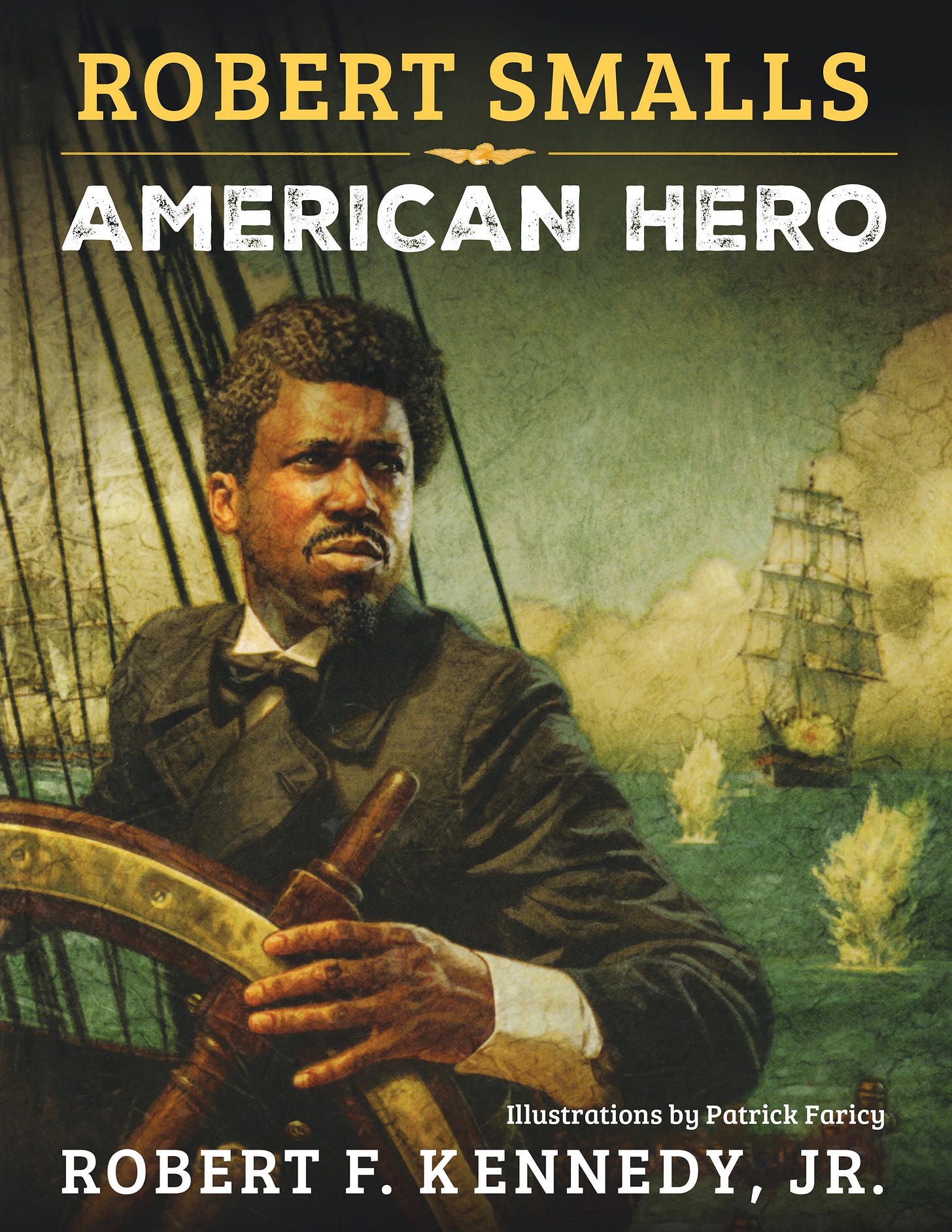Sailor, Strategist, Speaker, Senator
A Review of Robert Smalls: American Hero, a book by Robert F. Kennedy Jr.
By Dawn Pier, Special to The Kennedy Beacon
Young readers will be inspired by Robert Smalls: American Hero, a biography of the Black American who in 1862 led a group of nine enslaved men to commandeer a Confederate steamship, the Planter, and deliver her from Charleston, South Carolina, to the Union Navy. The book will be reissued on October 17.
Through his courage, Smalls irrevocably influenced the outcome of the Civil War and the progress toward freedom for countless Black Americans. His heroic actions not only changed the course of the war in favor of the Union, but led to the emancipation of slaves by dispelling the commonly held belief that “Southern slaves did not crave freedom and were incapable of decisive and deliberate action.” Smalls and his co-conspirators proved that enslaved Black men were willing to face daunting odds in their search for freedom, impressing White Americans so much that the resulting change in attitudes allowed President Lincoln to issue the Emancipation Proclamation.
Smalls, who “drew great crowds as an eloquent public speaker,” went on to accomplish many firsts for Black Americans: he captained ships in seventeen Civil War battles, was elected to the South Carolina Senate, and was the first Black member of Congress, where he served for 10 years, his efforts devoted to promoting the ideals of an America that treated all people fairly, regardless of their race. Kennedy writes that Smalls “played an important role in making America – for a short time – a true representative democracy for the first time in her history.”
Educators will find the 10 brief but comprehensive chapters a useful distillation of the complex historical role of Robert Smalls. The book starts with the childhood lessons he learned from his mother – an astute woman who, despite their relatively peaceful existence under the ownership of a benevolent master, didn’t hide from him the realities of what it meant to be a slave in America – and concludes with a clear summary of his legacy in the fight for equality for Black Americans. Quotes from contemporaneous newspaper articles (an internet link is included among the list of references) lend this true story greater immediacy than it might otherwise convey, an important consideration for material intended for use by educators.
This is the second book in Kennedy’s “American Heroes” series for young readers. Originally published in 2008 by Hyperion Press, it was reissued this year under the Sky Pony Press imprint (a subsidiary of Skyhorse Publishing). According to both publishers, it is intended for readers eight to twelve years of age. In my opinion, the average eight-year-old will have difficulty with the length and complexity of many sentences and some of the vocabulary, and the book may be more appropriate for readers aged ten and up.
Younger readers who find it a challenging read will nevertheless be intrigued by Patrick Faricy’s highly realistic artwork, seventeen images that include black-and-white illustrations and full-page paintings rendered in vibrant colors. At just 48 pages, including the illustrations, title page, introduction, and reference page, the book is short enough not to intimidate most readers. As such, Kennedy’s biography of the incredible accomplishments of a Civil War hero and his lifelong efforts on behalf of Black Americans’ civil liberties constitutes a valuable tool for educating all Americans about an important figure who influenced the direction of America’s history.
I can’t imagine a native-born American reaching the age of six without knowing on some level who Martin Luther King Jr. was. But “Robert Smalls” is a name few Americans know. One could argue there would not be an MLK Jr., nor the 1960s Civil Rights movement he led, without the vital groundwork of his predecessor, Robert Smalls.





Thank you so much, Bobby, for this gift to all Americans. It is essential that we join together to meet the great challenges present in our world. It is essential to realize that we have a lot more in common as members of the human race than we do with the intelligent races that intervening in our world from other worlds. There are lots of reasons to unite in just our own world--but humanity is emerging into a Greater Community of worlds and some of the races from these worlds are here and intent on taking over our world. If you wonder why our world is so divisive and why members of the elite are undermining our civilization--consider that there are members of other worlds present here and manipulating us through the mental environment. This is their area of expertise and one where humanity is very vulnerable. I am so grateful for your message of unifying the people of our world. This is the last thing these races would want and most important to our ability to enter this greater arena as a free and sovereign race. AlliesofHumanity[dot]org
I love this book! I had never known about this courageous, important man until I read it. Thank you, Mr. Kennedy!